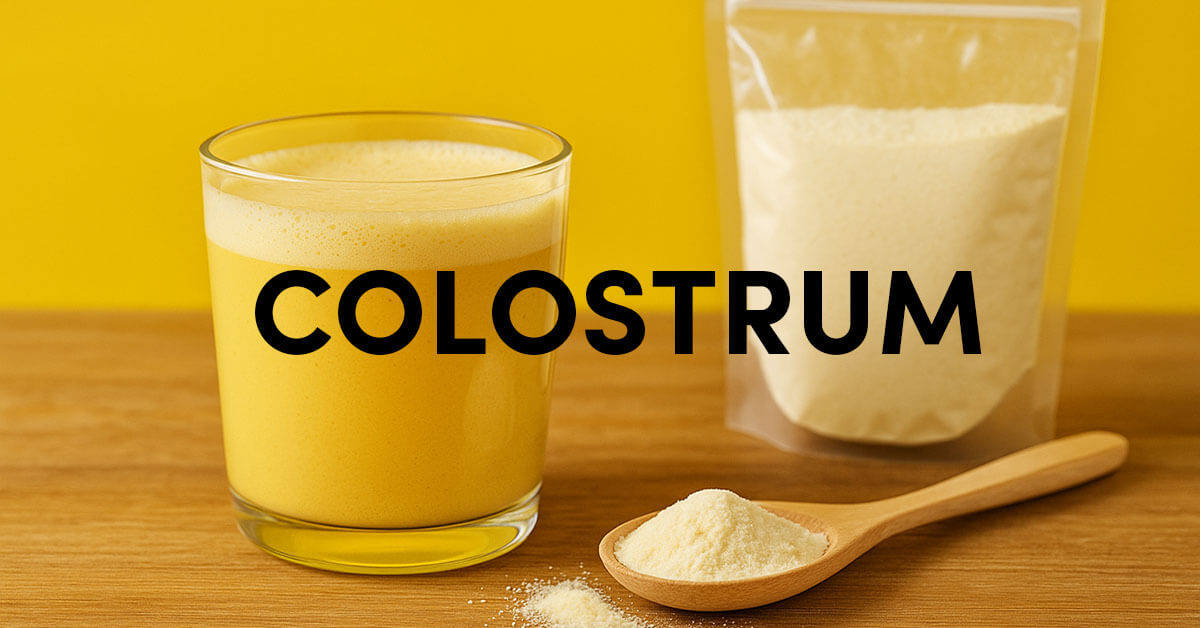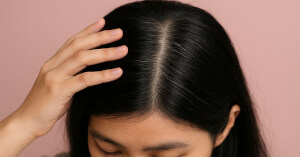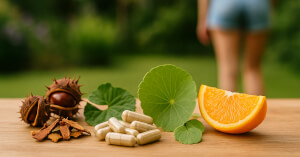
Colostrum Benefits for Skin and Immunity: Why This Trendy Supplement Is Everywhere

If you’ve spent more than five minutes scrolling wellness TikTok, you’ve probably seen it: influencers sipping frothy lattes, beauty bloggers slathering on creams, all dropping the same buzzword: Colostrum. Once known only to nutrition scientists and dairy farmers, this “first milk” has officially gone mainstream. And It’s giving collagen a run for its money...
But behind the pastel packaging and glossy Instagram reels, there’s real science. Colostrum is rich in bioactive compounds that support the immune system, repair the skin barrier, and may even help your body bounce back after stress. Let’s dive into what the research actually says about this glow-up elixir.
Colostrum and Skin Health: The New Glow Filter
Think of colostrum as skincare that works from both the inside and outside. Packed with growth factors and proteins, it helps your skin stay plump, hydrated, and resilient. Topical formulas have been studied for their ability to improve barrier function, reduce water loss, and give that coveted “lit-from-within” glow.
📊 Clinical Evidence: In a double-blind, placebo-controlled study with 52 women aged 40–70, a cream containing 15% sheep colostrum lyophilizate significantly improved hydration and reduced transepidermal water loss after 8 weeks compared to placebo (Applied Sciences, 2024). Earlier clinical work also suggested colostrum dressings enhance wound healing in chronic ulcers.
Colostrum for Acne, Eczema and Rosacea
Colostrum also shows promise across several common skin concerns. In mild to moderate acne, both topical colostrum creams and oral milk–derived actives like lactoferrin have reduced lesion counts and oiliness in clinical trials.
In eczema, milk-based topicals have performed comparably to low-dose hydrocortisone in infants, hinting at barrier and anti-inflammatory effects.
For rosacea, hard data with colostrum itself is still limited, but the same mechanisms studied in acne and barrier repair (immunoglobulins, lactoferrin, growth factors) suggest a plausible rationale for calming redness-prone, reactive skin. Translation: early signals are encouraging, yet larger, targeted trials are still needed.
📊 Clinical Evidence (Skin): Topical sheep-colostrum creams (≈15%) improved hydration and reduced transepidermal water loss in randomized trials over 8 weeks. In acne, a colostrum-based cosmetic improved parameters in adults with mild to moderate acne, and oral lactoferrin combined with vitamin E and zinc significantly reduced acne lesions in a double-blind RCT. For eczema, topical human milk showed efficacy comparable to 1% hydrocortisone in infants. Colostrum dressings have also aided chronic wound healing. Evidence specific to rosacea remains preliminary and inferential.
Colostrum for Immunity
From long-haul flights to the back-to-back meetings that leave you run down, your immune system takes a beating. This is where colostrum steps in. With immunoglobulins and lactoferrin, it helps reinforce your first line of defense. No wonder athletes and frequent flyers are paying attention.
📊 Clinical Evidence: A triple-blind, placebo-controlled trial in young adults showed that bovine colostrum supplementation reduced the incidence of upper respiratory tract infections during the study period. Meta-analyses in athletes confirm colostrum can lower gut permeability and support mucosal immunity by increasing secretory IgA.
Dosage and When to Take It
Clinical studies most often used 10–20 g of bovine colostrum powder per day, usually split into two servings. Some trials went as high as 60 g for short durations, but those were specific research settings.
For skincare, a cream with about 15% colostrum lyophilizate applied twice daily for 8 weeks showed measurable benefits. That said, most consumer formulas on the market are lighter, meaning results may vary.
✔️ Typical Dosage Range:
- Oral powder: 10–20 g daily, divided morning and evening, for 4–8 weeks. Best taken on an empty stomach with water for optimal absorption, though those with sensitive digestion may prefer to take it with a light meal.
- Topical: Creams around 15% colostrum extract applied twice daily for 8 weeks. Always check product labels and adjust based on tolerance.
Safety, Quality, and What to Watch Out For
Quality matters. Look for colostrum harvested in the first 24 hours post-calving, processed gently to preserve bioactives, and verified by third-party testing. The real deal should specify immunoglobulin content on the label.
As for safety, most healthy adults tolerate it well. But avoid colostrum if you have a dairy allergy. And if you’re pregnant, breastfeeding, or taking immunomodulating drugs, definitely check with your doctor first. A little digestive upset at the beginning is normal, start low and go slow.
Bottom Line
Colostrum may be trending, but this isn’t just a fleeting wellness fad. For skin, it brings hydration and fight inflammation. It can also gives a big boost to your immune system. Is it a miracle? No. But it's worth a test run in your wellness ritual.
FAQs About Colostrum
What exactly is bovine colostrum?
Bovine colostrum is the first milk produced after a calf is born. It is naturally rich in immunoglobulins, lactoferrin, and growth factors that support immunity and barrier function.
Can colostrum improve skin health?
Early human data suggests topical colostrum may improve hydration and reduce transepidermal water loss. Orally, it supports gut and immune function, which can indirectly help skin balance.
Can colostrum help with eczema?
Preliminary studies suggest milk-based topicals, including colostrum, may help soothe eczema symptoms by improving barrier function and reducing inflammation. Evidence is still limited but promising.
Can colostrum help with acne?
Yes, small clinical studies show that colostrum-based creams and oral lactoferrin (a protein found in colostrum) may reduce acne lesions and oiliness. More research is needed for long-term use.
Can colostrum help with rosacea?
Direct evidence is scarce, but the anti-inflammatory and barrier-supporting compounds in colostrum suggest potential benefits for rosacea-prone skin. Current support is more theoretical than proven.
Can you give colostrum to children?
Colostrum supplements are sometimes marketed for kids, especially for immunity. However, research in children is limited. Always consult a pediatrician before use, particularly if your child has allergies or immune conditions.
How long until I notice results?
For topical use, many people assess changes after 6 to 8 weeks. For oral use, immune or gut comfort benefits are often evaluated after 2 to 8 weeks of consistent intake.
What is a typical dosage?
Oral powder: 10 to 20 g per day, usually split morning and evening, for 4 to 8 weeks. Topical: creams around 15 percent colostrum extract applied twice daily for 8 weeks.
Should I take colostrum on an empty stomach or with food?
Empty stomach is preferred for absorption. If you feel digestive discomfort, take it with a light meal and build up gradually.
Is colostrum safe?
It is generally well tolerated in healthy adults. Avoid if you have a dairy allergy. If you are pregnant, breastfeeding, immunosuppressed, or on immunomodulating therapy, talk with your clinician first.
Any side effects to watch for?
Occasional digestive upset can occur when starting. Reduce the dose or take with a light meal. Stop use and seek medical advice if you notice allergic reactions.
How do I choose a quality product?
Look for early harvest within 24 hours post calving, gentle processing, third party testing, and clear immunoglobulin content on the label. Transparent sourcing is a plus.
Bovine vs goat colostrum: is there a difference?
Both contain bioactive compounds. Bovine products are more common and better studied. Choose based on availability, tolerance, and label transparency.
Can I mix colostrum into coffee or smoothies?
Yes, but avoid very hot liquids if possible to protect heat sensitive proteins. Warm water or a cool smoothie works well.
This article was originally published on Stackbb, your trusted source for science-based supplement guides.







